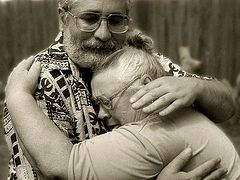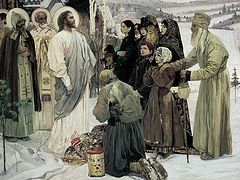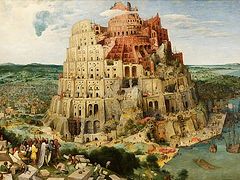 St. Macarius of Optina
St. Macarius of Optina His relatives were spiritual people: his great-grandfather was a monk in a monastery, who was known for his strict life as an ascetic. His grandparents were notable for their piety and charity. His grandmother visited prisoners every Saturday, baking a batch of pies for them with her own hands. This good deed later saved their lives, along with his grandfather’s: one winter a gang of robbers attacked their carriage, and one of the robbers persuaded the leader to spare the travelers, having recognized the woman from whose hands he so often received alms in prison. The elder’s father and mother lived not far from Optina Hermitage, next to the Lavrentiev Monastery. They often went to the monastery services and received spiritual guidance from the monastery’s confessor, Archimandrite Theophan.
St. Macarius—in the world Mikhail Nikolaevich Ivanov—was quiet and meek as a child and adolescent: he preferred reading, prayer, and playing the violin to noisy games and amusements. When he was only five years old his dear mother died, and the child withdrew even more from the noisy fun of his peers.
His pure soul sought spiritual podvig,1 and the future starets2 began the monastic life when he was only 22 years old, staying at the Ploschansk Monastery where he had gone on a pilgrimage.
St. Macarius arrived at Optina Hermitage in 1834, when he was 46 years old and already a spiritually experienced ascetic: he was not even 40 when he was assigned to be the confessor at one of the convents. In Optina, this guide of the numerous spiritual children who enjoyed his counsel, this confidant of the great Optina elder Leo showed the traits of true humility and meekness in his actions. St. Macarius never did anything without St. Leo’s blessing. He ascribed the successes and good fruits of all his undertakings to the prayer and counsels of his spiritual father, and grew spiritually with each new day.
The position of Skete3 Superior, which the starets took on in 1839, did not change his meek and humble temperament in the least. When St. Leo subjected his younger spiritual friend to reproofs and rebukes, not letting a chance go by to provide him with the crowns of humility and patience, St. Macarius took all the rebukes with meekness and love, and prospered spiritually.
Here is one of many examples: When Father Superior asked St. Macarius to receive “from the mantle” those brethren who were preparing for tonsure, Fr. Macarius humbly agreed. But when he came to Elder Leo and meekly told him about the Superior’s request, Elder Leo—having in mind the spiritual benefit of Fr. Macarius and of the monks who were standing around them (to the one, to grant a crown of humility; to the others to learn humility, patience, and meekness from him)—strictly asked:
“What—you agreed?”
“Yes, I almost agreed—or, rather, I didn’t dare to refuse.”
St. Leo assumed the look of one who is enraged and reproached St. Macarius:
“Yes, that’s a characteristic of your pride…”
Everyone present froze, watching Fr. Macarius’ meekness and humility with pious amazement, for they regarded him as being on a par with St. Leo. But St. Macarius stood with his head hanging, humbly bowing, and repeating only:
“I’m at fault, forgive me for God’s sake, Father!”
But when Elder Leo fell silent, Fr. Macarius bowed and touched his hand to the ground and asked,
“Forgive me, Father—do you bless me to decline?”
“How can you decline? You asked for this—and now you’re going to decline? No, now you can’t decline—the deed is done…” answered the starets, having made his point.
The elders labored hand in hand for seven years, and together they spiritually brought up the great elder Ambrose. After Fr. Leo’s death in 1841, all the burden of being a spiritual guide fell on St. Macarius. He continued to give all his strength to the external and internal improvement of the Skete, and to the spiritual guidance of his many [spiritual] children. The doors of his cell and his heart were open at all times for those who came to him and those in need. The elder’s cell-attendant testified that in twenty years’ time not once did he see the elder get angry with any of the brethren for coming at an inopportune moment, even including his short hour of rest after trapeza4.
St. Macarius headed the group of scholars and writers (monks and laymen) who translated, edited, and put the writings of the greatest ascetics of ancient times into literary language:5 Isaac the Syrian, Macarius the Great, and John of the Ladder (on the whole, in the translations of Elder Paisius Velichkovsky). His spiritual children, the Kireyev brothers, rendered him great assistance in this matter. Under St. Macarius’s influence there arose a whole school of publishers and translators of spiritual literature, of which Orthodox Russia was so in need.
Archimandrite Leonid (Kavelin) described the elder during those years thus:
“Of average height, all grey, dressed in an old worn mukhoyar6 riassa in the summer, and a very, very worn old fur coat covered with dark green drap-de-dames7, with a crutch in one hand and his prayer rope in the other.
There was nothing striking about his face at first glance—in general it was not handsome (in the usual understanding of physical beauty), it was even somewhat irregular, with the sadness of constant immersion into himself, consequently, he looked more strict than endearing. But such was the power of grace, that this face, serving as a mirror of his pure abundantly-loving and humble soul, shone with some sort of unearthly beauty, reflecting in itself one or another of the qualities of the inner man, the fruits of the Spirit listed by the Apostle. On the whole, there was united in him a rare combination of simplicity, quiet, and humility, making him accessible to each and every one.”
His spiritual children remembered St. Macarius thus:
“The starets was of enormous height, with an unattractive face marked with the traces of smallpox, but white and bright—his look was quiet and full of humility. His temperament was extraordinarily lively and active. His memory was excellent: after a person’s first confession St. Macarius remembered that person for the rest of his life. But a speech defect and shortness of breath in conversation bothered him all his life. He was always dressed in poor clothes. But on the other hand, he was clairvoyant: the first time he saw a person, sometimes he would call him by name before the person introduced himself. At times he answered questions in letters before he had received the letter, so that the person writing received an answer to a letter that he had sent only an hour ago.”
The elder’s many letters to monastics and laypeople contain guidance on the path to salvation, comfort in sorrows and the resolution of perplexities about the most varied spiritual questions. These letters are read even in our time with great spiritual benefit. The elder instructed:
“Faith does not only consist of believing that God exists, but also believing in His all-wise Providence, directing His creatures and arranging everything to the good: the times and the seasons are put in His own power (cf. Acts 1:7), and He determined the bounds of each of our lives before we came into existence. And we believe that without His will not a bird will fall, nor a hair of our head will perish (cf. Luke 12:6, 21:18).”
“Each of us is faced with a test of our faith, but not to everyone at the same time, and not in the same things: one person is tried by poverty, burdened with a family, not having daily subsistence; others by the deprivation of honor and by ignominy; another by the transition from wealth to poverty; another through disharmony with one’s spouse, by his children’s bad behavior, deep sorrow gnaws at him or he grieves, not having children—the hope and support of his old age; another by losing his spouse, friend, brother, children, parents or relatives, and they are burdened by many other various sorrowful incidents, but all this happens by the all-wise and undiscoverable judgments of God.”
The saint used to explain to people the spiritual law by which the Lord humbles us according to the extent of our pride, while according to the extent of our humility he rewards us and comforts us:
“According to the extent of our humility he rewards us and comforts us, while according to the extent of our pride he humbles us. What is here is brief and transitory, but eternity is never-ending; by sorrows here the Lord leads us to eternal blessedness, even if we go unwillingly.
We have to take care about arranging our lives and about our soul. We are full of passions, but we have high dreams; we always read and talk about humility, but when it comes down to reality, we can’t bear either a word or a glance.”
More of the Elder’s teachings:
“Be assured that God does not send us temptations beyond measure, except perhaps for pride, for conceit, and for complaining, by which we ourselves aggravate our sorrows. Beware of complaining and being faint-hearted. Magnanimity and patient endurance lighten sorrows, but faintheartedness and grumbling increase them and make them more burdensome.”
Many cases of spiritual help and healing by St. Macarius’s prayers are known to us. Here are only a few of them:
“Nun Tatiana Ivanova told the following story about the starets: ‘Once a rabid wolf in our locale bit several peasants badly, including two muzhiks belonging to my lady.8 Just then Father Macarius came to us. They sent the peasants who had been bitten to the hospital, but the elder did not bless my lady’s peasants to be brought there. They were summoned to Father. He blessed them, sprinkled their wounds with holy water and comforted them with the hope of God’s mercy, since they were having a very hard time and were afraid of contracting rabies. Then he told them to make three bows apiece, to pray to the Queen of Heaven and to St. Nicholas the Wonderworker, and to drink water blessed at Holy Theophany in the mornings. They did this and remained alive and well; but all the others, who were sent to the hospital, died.’”
Here is a story about the healing of a sick child:
“Five-year-old Dasha suffered from a fever and stomach upset in the monastery. She would often vomit, especially after she ate some fried fish, as would happen sometimes. Once Fr. Macarius came to us in the monastery and visited our cell. They informed him about Dasha’s fever. ‘We’re going to take her away,’ he said and sat the sick girl down with him to eat dinner. Once the hosts remarked to him, ‘Batiushka,9 why are you sitting the girl down with you?’
But he stood his ground and ordered the girl to eat fish soup out of the same bowl with him. Then they served fried carp. The elder cut it in half lengthwise and kept half for himself, then told the girl to eat the other half. She began eating it and cried, sure that after this delight she would begin to vomit hard. But the elder, in spite of her tears, made her eat the whole half of the carp that he had set aside for her. The girl obeyed. Then Batiushka, taking final leave of us, set off for home, while Dasha appeared to be perfectly healthy. She never suffered from a fever or vomiting again.”
Healings of possessed people occurred especially frequently. Archimandrite Fr. Leonid (Kavelin) wrote:
“Many of us remember one possessed woman, who sat on the path from the monastery to the skete and railed at the elder, saying among other things, ‘Will this Macarius die soon? He has stirred up the whole world. Oh, woe is me!’ Attracted to the elder by her husband’s faith, this woman, who had suffered for several years from demon-possession, became completely well after taking oil from Holy Unction that was given to her by the elder. Later on she delivered a baby, who cried unceasingly, without letup. But when they brought him to the elder, who made the Sign of the Cross over him and blessed him in God’s name, the infant calmed down, and from that time on the round-the-clock howling that had horrified his parents ceased, by God’s mercy.”
Alexei Vasilievich Govorov, son of a landowner of Livensk uyezd in the Orlov guberniya10, used to tell the following about himself:
“I had long been subject to heavy drunkenness. When the time would come to take a drink, no force on earth could hold me back from this weakness. By doing this I completely ruined both my own condition and my family’s. People would advise my wife to turn to different people in the hope of receiving healing from my illness; but the matter somehow didn’t go well. They finally advised me to go to Optina to Fr. Macarius. So my wife and I set off.
But on our arrival, when we explained about my illness to the elder, he only tapped me on the head three times lightly, playfully; and then he told me to prepare for communion of the Holy Sacrament.11 But when I started to approach the Holy Mysteries, I began to ache all over so, that I was not in a condition to go up. I hurt and was shaking, and the evil thought repeated, ‘What are you going for? What, will Communion help you? All this is nonsense. Drop it! Get out of here!’ And some invisible force pushed me back. However, my wife, by her persuasion and strength, helped me to go to the Holy Gifts. Right then and there, I felt relief after Communion, which in time became stronger and stronger in me.
But when at last I completely calmed down, there was born in me such an aversion to all alcoholic drinks that I could not even stand the smell of them. And for six years now I haven’t even been able to take a sip of mead,12 or beer, or champagne…. After Fr. Macarius died, when we heard the news, we grieved terribly, especially my wife. He appeared to my wife at night, exactly as she used to see him alive, in the same clothes, only his appearance was far brighter, and he said, ‘Don’t be sad! Continue to travel to Optina. You will receive the same thing even from my remains13 that you received from me alive. I’m still the same!’ But when we were wondering whether to go or not, and how to go, the elder appeared again in a dream and said, ‘Why aren’t you going to Optina? I said that I’m the same; and you will receive the same benefit from my remains as you received from me alive.’ And we didn’t dare to doubt any more.”
O Holy Father Macarius, pray unto God for us sinners!




